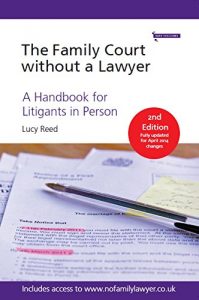The Family Court without a Lawyer is the book you need if you are involved in disputes with your ex over money or children and do not have a lawyer to represent you in court.
This 2nd edition is fully up to date with the new procedures introduced to the Family Court in April 2014. Armed with this book you will be able to present your own case effectively and confidently before the judge, many of whom will be familiar with the book, increasing your chances of achieving a good outcome.
Lucy Reed, a specialist family law barrister and legal writer, has distilled the knowledge and expertise gained from representing clients in court to write the essential guide to the family courts for the non-lawyer. In clear language she provides a thorough guide to the law that you will need to know, plus countless tips and insights on how you should best prepare and present your case such as: what to expect and where to go when you turn up at the court; what to think about when deciding to call a witness; how to challenge a judge's decision through an appeal, clear explanations of legal terms, jargon and concepts
You will also have full access to nofamilylawyer.co.uk, where you will find useful supporting documents and resources,such as model agreements, forms and updates. All this practical advice and support makes Family Courts without a Lawyer much more than just a DIY divorce book.
Recently commended by a group of senior family judges and lawyers, it is a practical tool to help you in court and a reference to help you understand what happens in family proceedings, whether or not you have a lawyer.
This 2nd edition is fully up to date with the new procedures introduced to the Family Court in April 2014. Armed with this book you will be able to present your own case effectively and confidently before the judge, many of whom will be familiar with the book, increasing your chances of achieving a good outcome.
Lucy Reed, a specialist family law barrister and legal writer, has distilled the knowledge and expertise gained from representing clients in court to write the essential guide to the family courts for the non-lawyer. In clear language she provides a thorough guide to the law that you will need to know, plus countless tips and insights on how you should best prepare and present your case such as: what to expect and where to go when you turn up at the court; what to think about when deciding to call a witness; how to challenge a judge's decision through an appeal, clear explanations of legal terms, jargon and concepts
You will also have full access to nofamilylawyer.co.uk, where you will find useful supporting documents and resources,such as model agreements, forms and updates. All this practical advice and support makes Family Courts without a Lawyer much more than just a DIY divorce book.
Recently commended by a group of senior family judges and lawyers, it is a practical tool to help you in court and a reference to help you understand what happens in family proceedings, whether or not you have a lawyer.






